
Topics
Guests
- Rev. Waltrina Middletoncommunity organizer and minister with the group Cleveland Action. Close to the families of Timothy Russell and Malissa Williams, the unarmed pair killed in their vehicle by Cleveland police.
- Alice Raglandactivist with the Ohio Student Association, which has led a series of protests around police brutality in Ohio.
The national conversation on policing African-American communities is focused on Cleveland today after a major federal settlement and a controversial verdict. The Justice Department has reached an agreement with Cleveland over a pattern of what it calls “unreasonable and unnecessary” force by police. A probe last year found “chaotic and dangerous” abuse across hundreds of incidents. This comes just days after an acquittal in a case that helped launch the probe. On Saturday, Officer Michael Brelo was found not guilty of manslaughter for the fatal shootings of two unarmed African Americans in their car. In November 2012, Brelo was one of 13 officers who fired 137 rounds at Timothy Russell and Malissa Williams after a chase which began when officers mistook a backfiring car for gunshots. Officer Brelo personally fired 49 shots, at least 15 of them at point-blank range through the windshield after he climbed onto the hood of the car. In a verdict on Saturday, Judge John O’Donnell said he can’t prove Belo shot the fatal bullets, since 12 other officers also opened fire. O’Donnell also said Brelo had grounds to fear for his safety. We are joined by two guests: the Reverend Waltrina Middleton, a community organizer close to the families of Russell and Williams; and Alice Ragland, an activist with the Ohio Student Association, which has been organizing around the issue of police violence in Ohio.
Transcript
AARON MATÉ: The national conversation on policing African-American communities is focused on Cleveland today after a major federal settlement and a controversial verdict. The Justice Department has reached an agreement with Cleveland over a pattern of what it calls “unreasonable and unnecessary” force by police. A probe last year found unlawful abuses across hundreds of cases. The federal settlement could lead to independent oversight and revised policies.
This comes just days after an acquittal in a case that helped launch the probe. On Saturday, Officer Michael Brelo was found not guilty of manslaughter for the fatal shootings of two unarmed African Americans in their car. In November 2012, Brelo was one of 13 officers who fired 137 rounds at Timothy Russell and Malissa Williams after a 22-mile-long, high-speed chase. The incident began after police tried to stop Russell for a wrong turn. After Russell sped away, more officers then reported gunfire from his car. But there were no guns. Instead, prosecutors say the car was making noises from backfiring.
AMY GOODMAN: The chase involved speeds of up to 100 miles per hour. More than 60 police cruisers took part, even though the rules for chases allow only two. After the other officers had stopped shooting at the victims’ car, Officer Brelo mounted the hood of the car and fired at least 15 shots through the windshield. Timothy Russell was shot 23 times; Malissa Williams, 24 times. But in a verdict on Saturday, Judge John O’Donnell said he cannot prove Belo shot the fatal bullets, since 12 other officers also opened fire. O’Donnell also said Brelo had grounds to fear for his safety.
JUDGE JOHN O’DONNELL: I find, by a preponderance of the evidence, that Brelo’s decision to use deadly force against Russell and Williams was based on probable cause to believe that they threatened imminent serious bodily harm to him and the other officers, not to mention the public. I therefore find that his initial decision to use force was constitutionally reasonable.
AARON MATÉ: A report from the Ohio attorney general called the chase and shooting the result of, quote, “a systemic failure in the Cleveland Police Department.” More than 60 officers were suspended over their roles. But Brelo was the only officer to be criminally charged.
The families of Timothy Russell and Malissa Williams have voiced anger at Brelo’s acquittal. This is Renee Robinson, a cousin of Malissa Williams; and Paul Cristallo, attorney for Timothy Russell’s family.
RENEE ROBINSON: That was my cousin! That was my baby cousin. I’m going to tell you all something right now. We have no justice. They’re killing kids. They’re killing women now. They’re just—they’re doing whatever they want to do, and nobody is not even doing nothing about it.
PAUL CRISTALLO: Not guilty is not the same as innocent. Jumping up on the hood of a car and firing 49 bullets down into two unarmed people can hardly be said to be innocent. And while the law and the court—and we respect the decision—found him not guilty, we want it to be known that, obviously, we feel that he has—he’s culpable and that he is far from innocent, as was the city of Cleveland in their role in this situation.
AMY GOODMAN: Paul Cristallo is attorney for Timothy Russell’s family. The not guilty verdict by the judge sparked a day of protests in Cleveland. Hundreds of people rallied outside Cleveland Justice Center and near the home of the county prosecutor.
RALLY SPEAKER: After 4,000 cases of injustice, we’re just adding another one to it.
PROTESTER: That’s right, brother. That’s right.
RALLY SPEAKER: And make no mistake about it: We are calm, but we’re mad as hell.
AMY GOODMAN: The protests later merged at the park where 12-year-old Tamir Rice was killed by a police officer last November. After a night of protests, Cleveland Mayor Frank Jackson said 71 people were arrested.
MAYOR FRANK JACKSON: The majority of the protesters, yes, they were peaceful, although aggressive at the end of the day, but still peaceful. In the evening, however, there were some who crossed the line. And as a result, they were arrested. And they crossed the line, in some cases, by assaulting bystanders.
AMY GOODMAN: The Justice Department could unveil details of its settlement around Cleveland’s policing today. The city is also awaiting decisions on whether officers will be charged in the killings of two other unarmed African Americans: 12-year-old Tamir Rice, shot dead while playing with a toy gun in a park, and Tanisha Anderson, a mentally ill woman whose death has been ruled a homicide.
For more, we go right to Cleveland, where we’re joined by two guests. Alice Ragland is an activist with the Ohio Student Association, which has been organizing around the issue of police violence in Ohio. And the Reverend Waltrina Middleton is with us, a community organizer and minister with the group Cleveland Action, close to the families of Timothy Russell and Malissa Williams, the unarmed pair killed in their vehicle by Cleveland police in 2012.
Let’s begin with you, Reverend. If you could start by talking about the families’ reaction to the judge’s acquittal—this was a judge jury, not a jury of—not a jury, but the judge made the decision. Reverend Waltrina Middleton?
REV. WALTRINA MIDDLETON: Hi, thank you. The family was not surprised, but certainly disappointed. I think that they felt as if Officer Brelo would have at least been charged on a lesser charge. But to have no accountability is obviously grievous for the family, quite disappointing that there’s no accountability at all for the behavior of a police officer who likened himself to Arnold Schwarzenegger or Rambo, jumping on the hood of a car and shooting down into a car where people were surrendering. Autopsy reports showed that there were bullets in the palm of Timothy and Malissa’s hands, and that suggests a posture of surrendering. And even the judge himself, even as the judge attempted to present Brelo as a hero, acknowledged that his behavior endangered himself and his fellow officers. And I don’t see anything reasonable or rational about his behavior. And the family is quite disappointed that justice failed and that, while Timothy finally had his day in court, justice failed to bring him justice.
AARON MATÉ: Well, Waltrina, I think, for many people across the country, this verdict and the ensuing protests marked the first time they’ve heard about this case, so take us back to this night in November 2012. What happened? They’re driving in their vehicle. An officer tries to stop them for a wrong turn. They speed away. And then, what happens next?
REV. WALTRINA MIDDLETON: Well, there is a, what the police has reported, a 25-mile pursuit of Timothy and Malissa. They were accused, falsely, of shooting at the officers, which was later determined to potentially be a backfire of the car. But even as they fleed the scene, that’s not grounds for murder. That’s not grounds for execution. And they were executed with over a hundred shots sprayed into their vehicle. Eventually, the car came to a stop at what is called Heritage Middle School. The police accused the couple of trying to use their vehicle as a weapon. The family, obviously, aware of the character of their loved ones, highly dispute that, especially after the autopsy reports showed that there were bullets in the palm of their hands. And while the judge stated that Officer Brelo had every right to be afraid for his life because of the calls over the radio system that said they have a gun, they’re shooting, he didn’t point out that there were also recordings where there were persons saying it’s not a gun, it’s a soda can in their hands. And so, I feel as if the judge pretty much presented a case to fill the holes to protect the officer and to ensure that others would not be convicted. I think that this is this unity or unified front to protect officers, even when they’ve certainly violated their own code to service and protect.
The family tells the story of Timothy Russell being an evangelist who shared his faith with others and who always had an infectious smile on his face and that he would not hurt a fly. And so, this portrayal of these two people, in spite of whatever personal challenges they may have, that most human beings suffer from, is not fair. And also, the case itself was one-sided, presenting the story of the police officers, and a mischaracterization of person, criminalizing the victim simply because of their past, which had nothing to do with the shooting and the execution that they experienced.
AMY GOODMAN: Alice Ragland, you’re with the Ohio Student Association. You’ve been deeply involved in these protests. Why is Brelo the only one on trial? I mean, 137 rounds were shot at the car. He, himself, shot—what was it? Forty-nine shots at Malissa and Timothy. But why is he alone being charged with their killing?
ALICE RAGLAND: That’s something that I’m still trying to figure out, and that’s something that people in the activist community are still trying to figure out. There’s been a lot of confusion around that, the fact that there were 13 officers who fired shots and 64 officers were found to have violated their orders, but none of them were suspended for more than 10 days. So that’s a question that I still have.
AARON MATÉ: And, you know, part of Brelo’s defense was that he thought that the couple, the pair, was firing at him because of the gunfire that was actually coming from the officers. A defense expert testified, “Officers are actually firing and hitting the police vehicles, especially (police car) 238.” Brelo believed the shots were coming from inside the suspects’ car, when in fact the shots were just coming from his fellow officers.
ALICE RAGLAND: Right, they were coming from his fellow officers. So, that, I guess, supposedly made him feel like he was fearing for his life. But I think that that’s completely ridiculous. I think that that is an excuse that was used to find him innocent.
AMY GOODMAN: I want to turn to the attorney for Office Brelo, Patrick D’Angelo. Praising the not guilty verdict, D’Angelo said his client had defeated an “oppressive government.”
PATRICK D’ANGELO: We stood toe to toe with an oppressive government trying to coerce and put away a law-abiding citizen who did his job in this case, even though there were tragic circumstances and outcomes. And we fought, the four of us, against all odds. And I am so happy that we can walk out of this courtroom with our heads held high.
AMY GOODMAN: So, Reverend Waltrina Middleton, your response to what Brelo’s attorney says? Now, there were supervisors charged with minor issues, but the fact that a hundred police officers were involved with this, what are you calling for? I mean, there were mass protests over the weekend, over 71 people arrested. Today, the Justice Department is expected to announce an agreement with the police of Cleveland. What do you expect to come out of it? What do you want to see happen?
REV. WALTRINA MIDDLETON: May I first just address this idea of an oppressive system? When you have a system that protects abusive officers that hide behind a code of blue, that hide behind badges; where a 12-year-old cannot play in a recreation center without the threat of being murdered, in an open-carry state to say, “Oh, well, he looked like he was 21 or older”—it shouldn’t matter; it’s an open-carry state, so the child does not have the freedom to play in his own community without the fear of being murdered—his sister coming to his aid—and I’m speaking of Tamir Rice—and being handcuffed and placed in the back of a police car for trying to revive her brother; let’s talk about Tanisha Anderson, whose family contacted the police for support because of their sister’s mental health condition, and she was body-slammed and killed in the hands of officers; and the disproportionate—the countless, disproportionate deaths against black and brown bodies in this nation—I would question who is oppressed. So I want to speak to that.
I know that the family wants more than just the Department of Justice report that came out in December 2014. And so, it’s encouraging to know that the Department of Justice has come to some type of agreement with the city of Cleveland, but I hope it is more than symbolic. I pray that it’s actually taking those recommendations and putting it into action, so that people can go out without being criminalized, profiled and dying. I, myself, have been racially profiled by the police and stopped, just from trying to go from home to work. So I pray that it’s more than symbolic and that it will be fruitful so that people can live without being in fear.
AARON MATÉ: And, Alice Ragland, as this Justice Department settlement is announced today and as Cleveland awaits charges in the killings of Tanisha Anderson and Tamir Rice, what are you planning for next, and what do you hope for?
ALICE RAGLAND: I hope that all of the officers involved with the killings of Tanisha Anderson and Tamir Rice are charged and that they actually serve time. I mean, being charged is one thing, but we have so many cases where officers are indicted and charged, but they don’t—they don’t get found guilty. So, I hope that a judge and the justice system and a jury and whoever is involved with these cases will come to their senses.
AMY GOODMAN: I want to end with Vanita Gupta, the nation’s top civil rights prosecutor. In December, she unveiled the findings of the Justice Department probe. It detailed the history of abuse across hundreds of cases, characterizing police behavior in Cleveland as “chaotic and dangerous.”
VANITA GUPTA: The investigation concluded that there is a reasonable cause to believe that the Cleveland police engage in a pattern and practice of unreasonable force in violation of the Fourth Amendment. That pattern has manifested in a range of ways, including the unnecessary and excessive use of deadly force, including shootings and head strikes with impact weapons; the unnecessary, excessive or retaliatory use of less lethal force, including Tasers, chemical spray and fists; excessive force against persons who are mentally ill and in crisis, including in cases where officers were called exclusively for a welfare check; and the employment of poor and dangerous tactics that placed officers in situations where avoidable force became inevitable. Supervisors throughout the chain of command have endorsed questionable and sometimes unlawful conduct by officers. Officers are not provided with sufficient and adequate training, policy guidance and supervision to do their jobs safely and effectively.
AMY GOODMAN: That’s Vanita Gupta, the nation’s top civil rights prosecutor. I also want to thank our guests, Reverend Waltrina Middleton, minister with Cleveland Action, and Alice Ragland of the Ohio Student Association. Again, in the case of 12-year-old Tamir Rice, who was killed last November, there have still not been any charges brought against the officers involved with his killing. We will continue to follow this story. This is Democracy Now! But we will go after break to Belfast, to Ireland, for an historic vote. Stay with us.

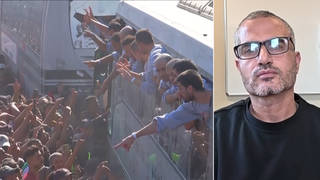
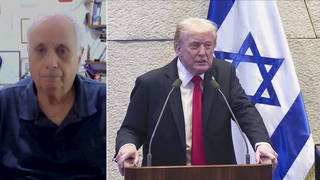
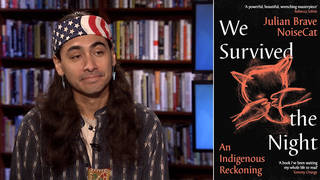





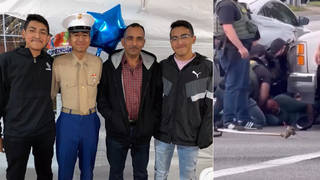
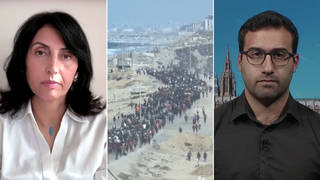
Media Options